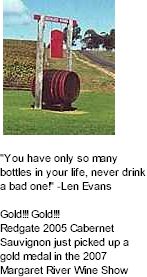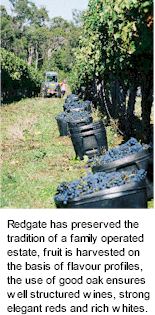


Close by the winery lies Redgate Beach (a favourite spot for both body surfers and fisherman) and a Redgate Road which runs from Redgate Beach to the village of Witchcliffe, there seems to be little in the way of official history in regard to where the Redgate name came from.

Bill Ullinger, the founder and proprietor of Redgate Wines, has passed on his version of how he came to use the name Redgate. Although there is no evidence to suggest that this version of events is anything but the truth, one tends to find that as the sun (and the wine bottle) go down in Margaret River the tales seem to grow ever longer with the shadows.
It would seem that not long after the turn of the last century there was a farmer whose farm was located just inland from what is now Redgate Beach and on what was to become Redgate Road. Now as Margaret River in those days was an extremely long way from any major towns (Perth would have been nearly a two day trip by carriage) there tended to be a relative shortage of places one could obtain an alcoholic beverage.
As the locals who lived around Redgate Beach found getting to the local watering hole a little difficult they decided they needed an alternative. And so the story goes that our friendly farmer, who happened to have a prominent Red Gate at the front of his property, decided that he would operate a spirit still that may not have been legal. Due to the secretive nature of this operation those in know would come to the farm and ask if there was any Red Gate available. Bill, in his wisdom, has deemed it not necessary to tell us the final outcome of this illicit operation, but if the local constabulary were anything like the rest of their Australian colleagues of the day, I'm sure they were always on top of quality control at Redgate.

Moving ahead to 1981 and the Ullinger's first vintage, Bill felt that this story accorded well with what he was trying to establish. That would be a place where all and sundry could drop by and ask for a drop of their favourite beverage in a warm and friendly environment where quality control was a watchword.
Bill Ullinger is the original owner of Redgate Wines, which he established in 1976. A World War II Lancaster pilot, Bill is renowned in the West Australian wine industry as one who speaks his mind whatever the consequences. Bill's colourful language and firm vocal stands on issues he believed in, have become a hallmark, in an industry dominated by powerful major companies.
The Redgate property is one of the southernmost vineyards in the Margaret River Region, situated just 3 kilometres from the Indian Ocean. Bill and Paul Ullinger originally made the wine themselves, but have used professional winemakers in recent years, the most recent addition being Andrew Forsell, who joined Redgate in 1995. Andrew hails from Melbourne, and was inspired to become a winemaker after visiting a vineyard in Victoria and tasting what he considered to be very poor wines. Resolving to produce far better quality wines he enrolled to study Wine Science at Wagga Wagga in 1979, he has since accumulated vast experience in both Australia and California.
Redgate is now a 22-hectare vineyard with varieties divided between Semillon, Sauvignon Blanc, Chenin Blanc, Pinot Noir, Cabernet Franc, Cabernet Sauvignon and small amounts of Riesling, Shiraz and Merlot. The vines are grown on soil varying from gravelly loam to sand with a clay base. A spring-fed dam supplies any water needed from November to February. Over the course of the next year or two, full production should be reached in the vineyard meaning that about 200 tonnes of Redgate's own fruit will be crushed each year at the winery making approximately 12,000 cases of wine.